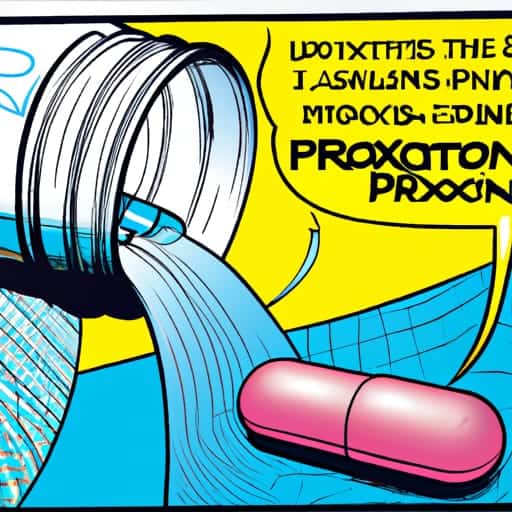How Long Does Paroxetine Stay In Your Body?

How Long Does Paroxetine Stay In Your Body?
The half-life of Paroxetine (Paxil) is known to be between 21 and 24 hours. This means that 50% of the drug is gone from a person’s body within 21 hours after they stop taking it. For example, if you took 10 mg of Paxil (paroxetine) all at once, there would still be 5 mg of the drug in your body after 21 hours.
This amount would go down to 2.5 mg after another 21 hours. Because of this, Paxil usually stays in a person’s body for about five days.
Even though Paxil is one of the SSRIs with the shortest half-lives, that doesn’t mean that getting off of it won’t cause some potentially serious problems. Read on to discover the withdrawal effects and how to avoid them.
Different things cause Paroxetine to remain in the urine. Most of the time, it would stay in the urine for one to three days, depending on how much was taken.
A big factor in this is how much water you drink. The speed at which Paroxetine leaves the body in the urine is affected by how well you are hydrated. But most of the time, Paroxetine wouldn’t show up in a urine test. This is because Paroxetine is an antidepressant, and because antidepressants are not considered to be drugs of abuse, urine tests are not made to find them.
Trade Names for Paroxetine
Paroxetine is also sold as Paxil cr and Seroxat.
What Kind of Drug is Paroxetine?
Paroxetine is a selective serotonin reuptake inhibitor (SSRI), which is a type of antidepressant medication used for anxiety, depression, and other mental illness. Other SSRIs include sertraline and fluoxetine (prozac). Paroxetine can help with mild to severe depression, are generally safe, and usually has fewer side effects than other antidepressants.
We know from a comprehensive 2018 study that it is one of the most effective antidepressants.
SSRIs treat depression by increasing the amount of serotonin levels in the brain. Serotonin is one of the chemicals that send messages between nerve cells in the brain. These chemicals are called neurotransmitters (neurons).
SSRIs stop serotonin from being taken back up into neurons. This makes more serotonin available, which makes it easier for neurons to talk to each other. The name “selective” comes from the fact that SSRIs mostly affect serotonin and not other neurotransmitters.
The route of drug administration is oral, that is by mouth as a single dose usually. It can be taken with or without food. Always follow medical advice.
How is paroxetine metabolized?
Paroxetine is well absorbed by the gut and is broken down in the liver in a process called “first pass metabolism.” The parent drug is changed into inactive metabolites. Its byproducts are passed out of the body in both urine and faeces.
How Long Does Paroxetine Take To Work?
Steady-state plasma concentrations were reached in 7-14 days with daily doses of 20-30mg of paroxetine
You might not see much improvement in your symptoms for a week or two, until the paroxetine starts working. Most of the time, it takes between 4 and 6 weeks to feel the full effects.
Do not stop taking paroxetine just because you don’t feel better after a week or two. Allow the medicine to work for a good amount of time, at least 6 weeks.

What Mental Health Conditions Does Paroxetine Treat?
There are many mental health conditions that paroxetine can be prescribed for. Some of the most common ones include major depressive disorder, obsessive-compulsive disorder (OCD), panic disorder and panic attacks, and anxiety disorder. It can be used for social anxiety disorder, and post traumatic stress disorder (PTSD).
It can take up to two weeks for the full effect of paroxetine to be seen, so it’s important to be patient. However, if dosage adjustments are necessary, your doctor will let you know. In some cases, discontinuation of paroxetine may lead to a relapse of the mental health condition and major depression. There are also potential side effects that can occur while taking paroxetine, so it’s important to be aware of them and talk to your doctor about your treatment plan before starting therapy.
Off-Label Uses
When taking medicine, it is important to be aware of all the possible off-label uses. This term refers to uses of a medication that have not been approved by health authorities.
Off-label use does not mean that the drug is being used wrongly or illegally. It just means that the FDA can’t give permission for new licensed uses until it has looked at new data from the drug companies about how well the drug works and how safe it is for that particular new use. This is an expensive process and often drug companies don’t do it, but a clinician will know whether it is safe and effective in an off label use.
It is sometimes prescribed off license for premature ejaculation.
What Other Medications Interact With Paxil?
If you’re looking to know how long paroxetine (aka Paxil) will stay in your system, you’re in luck! This medication is a serotonin reuptake inhibitor, which means it inhibits serotonin from being reabsorbed from the gut. As a result, paroxetine can stay in your system for a while. Other medications that interact with paroxetine include other SSRIs, serotonin norepinephrine reuptake inhibitors (SNRIs), tricyclic antidepressants (TCAs), monoamine oxidase inhibitors (MAOIs).
It’s important to consult a healthcare professional if you’re taking any of these medications and plan on taking paroxetine. They can help you determine the appropriate dosage and time frame for paroxetine’s clearance from your system.
Caution with Paxil
If you have an allergy to antidepressants, any other medications, or any of the ingredients in tablets (which can include lactose), let your doctor and pharmacist know right away. For a list of the ingredients, consult the Medication Guide in the packet or online, or speak with your pharmacist.
Inform your doctor if you are taking monoamine oxidase (MAO) inhibitors, or if you have recently stopped taking them. Your physician might advise against taking paroxetine. You should wait at least 21 days after stopping paroxetine before starting an MAOI.
Inform your physician about any herbal remedies and dietary supplements you are taking, especially tryptophan, 5-HT and St. John’s wort.
This kind of medication can reduce the levels of sodium in your blood. This is not usually a problem for most healthy people, but people who are not eating well or who are on lots of different medications may suffer low sodium levels and become unwell. You should always inform your doctor about any other medications or over-the-counter remedies you use.

Potential Adverse Effects (Side Effects)
Medication such as this increases the amount of serotonin in your system and serotonin makes it harder for your blood to clot. This is important if you have any bleeding disorders or history of bleeding from nose, stomach ulcers, or are going to be having surgery, including dental surgery. Also if you are using any other medication that makes blood harder to clot such as aspirin, warfarin, clopidogrel or any other, you need to be aware of increased bleeding risk.
Paroxetine can cause insomnia in some people, but others say it makes them sleepy. It can also make you less hungry and reduce your appetite.
Inform your physician if you are nursing a baby, intend to get pregnant, or are already pregnant. Many antidepressants can have negative effects on babies and can be passed to them either in the womb or through breast milk
Untreated depression in a mother is arguably a greater risk to the baby than taking an antidepressant, but some are safer than others and you should speak to a healthcare professional, a doctor or a midwife or nurse about whether you should start or continue to take antidepressants while pregnant or breastfeeding so you can come to a conclusion about what is best for both of you.
You should not drive a car or operate machinery if you feel that this medication has made you incapable of driving safely.
Drinking alcohol will make this medication less effective and drinking lots of alcohol will mean it doesn’t work at all. It may also make you become more intoxicated more quickly.
It’s important to be aware that paroxetine may result in angle-closure glaucoma (a condition where the fluid is suddenly blocked and unable to flow out of the eye causing a quick, severe increase in eye pressure which may lead to a loss of vision). Ask your doctor if you should get your eyes checked before beginning this medicine. Call your doctor or get emergency medical attention right away if you are experiencing nausea, eye pain, changes in your vision, such as seeing colored rings around lights, or swelling or redness in or around your eyes.
Tell your doctor and pharmacist about any other prescription or over-the-counter medications, vitamins, dietary supplements, or herbal remedies you are taking or plan to take.
Who Shouldn’t Take Paroxetine?
Women who take the antidepressant while they are pregnant are more likely to have a child with autism or a birth defects. Children are not supposed to take Paxil.
The FDA put a black box warning on Paxil about suicidal thoughts and actions in children, teens, and young adults, especially those with major depressive disorder. On the label of the drug, people younger than 24 are told to carefully weigh these risks against the clinical need.
What is Paxil Withdrawal?
Technically this is a discontinuation syndrome rather than a withdrawal, but it amounts to much the same experience for someone suffering it. According to the manufacturer, up to 7% of patients experience withdrawal symptoms like bad dreams, paraesthesia, and dizziness. It may be more than this.
If you stop suddenly without weaning off, you may suffer from agitation, sweating, and nausea.
SSRI withdrawal syndrome usually starts 24 to 48 hours after the drug is stopped.
On day 5, the symptoms are at their worst, and they usually go away in 2 to 3 weeks.
Drugs with a short half-life are more likely to cause withdrawal syndrome (paroxetine, fluvoxamine).
The severity of the clinical signs depends on how much of the drug is taken every day and for how long.
The most common symptoms are dizziness, vertigo, headache, nausea, flu-like symptoms, anxiety, confusion, irritability, vivid dreams, insomnia and sometimes diarrhea.
The discontinuation syndrome can be avoided by slowly lowering the dose and teaching the patient about the syndrome. When a withdrawal syndrome is intolerable, it is best to give the drug again and then slowly taper it off and take it away.
Overdose: What Happens If I Take Too Much Paxil?
An overdose of paroxetine can cause nausea, vomiting, cold and clammy extremities, slow heart rate and a drop in blood pressure, confusion, restlessness, and speech that doesn’t make sense.
Most patients get better with conservative treatment and need little medical intervention other than keeping an eye on them.
Most deaths caused by paroxetine toxicity have been caused by taking more than one drug, not just paroxetine.
But remember that overdoses can be fatal.
If you or a friend accidentally took too much of this medicine, it might be a small amount and there might not be any side effects. But you should always see a doctor.
If you’ve taken a lot, try to throw up and have someone call for help.
If someone is getting sick and showing signs of an overdose, they should always get emergency medical help right away.

Conclusion
We have talked through the benefits and side effects of paroxetine (Paxil or Seroxat).
According to what we know after some years of prescribing the drug, and according to evidence-based studies, paroxetine is a helpful antidepressant that can help you overcome your depression without any side effects. It is safe for long-term use and it is not addictive.
If other antidepressants have not worked, you should consider giving paroxetine a try.
Just remember not to exceed the amount of paroxetine set out in the regular dosage without consulting your doctor first!
Related Posts
5 Most Effective Antidepressants for Anxiety and Depression (and 3 you should avoid)
The Art, Science, and Magic of Prescribing Antidepressants
Duloxetine: Side Effects, Interactions and More
Is Venlafaxine A Good Medication for Anxiety and Depression?






